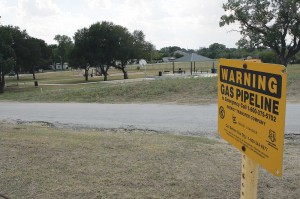On a crisp Saturday morning, Delga Park, just north of downtown Fort Worth, was beautiful. The deep blue sky was spattered with cumulus clouds, and birds flitted among shade trees at one end of the park, sandwiched between I-35W and the Trinity River. The grass was neatly trimmed and trash-free; the ball field sparkled. The only thing missing from the scene was anyone to enjoy it.
Over the course of nearly two hours not a single parent with a stroller walked the footpath. No kids played ball or swung on the swings or used the slide. No one except this reporter was enjoying a cup of coffee at the picnic tables.
Maybe the park’s emptiness was a fluke. Or maybe not: Within a half-hour of arriving, I felt a light searing of something acrid at the back of my throat. Within an hour my eyes began to unexpectedly tear, and after two hours I had to leave because breathing was becoming difficult, even though I was sitting still.
If a recent snapshot of the park’s air quality is accurate, the same might happen to anyone who spent time in the park — and to many who live in the neighborhood.

At the far end of the park is a huge natural gas compressor station built by Chesapeake Energy. Over the past several years, pictures and videos taken with forward-looking infrared (FLIR) cameras, which detect gases not visible to the human eye, have consistently shown the Chesapeake facility to be leaking huge plumes of poisonous gases into the atmosphere around Delga Park.
A June 1 air sampling by the nonprofit ShaleTest Environmental Testing, paid for by a $10,000 grant from the Patagonia Environmental Fund, showed the makeup of those emissions: benzene, a carcinogen, in quantities many times what is deemed safe by state guidelines; xylene, which can have developmental effects on fetuses, in concentrations much higher than allowed; and lower but still troublesome levels of toluene, also a carcinogen, plus a long list of volatile organic compounds that contaminate groundwater when they eventually sift out of the air and fall to earth.
The study, called Project Playground, involved collecting air samples in state-of-the-art canisters from five park areas in North Texas located near gas drilling or processing sites. One sample from each site was taken on single days between Oct. 28, 2012, and June 1, 2014. Besides Delga, the sites included Trinity Park in Fort Worth; McKenna Park in Denton; a playground in DISH, in Denton County; and a spot in Mansfield that’s surrounded by four parks. At Delga Park, pollution dispersion air modeling was also done to project how far the airborne toxins would travel from their source.
The study’s most damning finding is that benzene levels at three of the parks exceeded the Texas Commission on Environmental Quality’s maximum recommended limits for long-term exposure. At Delga Park the levels were more than seven times that maximum level; in DISH they were nearly three times the limit and in Denton one and a half times the limit.
Other troubling findings: Toluene levels exceeded TCEQ’s maximum for long-term exposure at two parks, and propene — also known as propylene, which can cause headaches, confusion, memory loss, and even seizures — was above the allowable levels at the Mansfield location.
Dozens of other dangerous chemicals were found that did not exceed TCEQ long-term exposure limits. However, many researchers believe those chemicals still represent a serious health threat. In combination, even at allowable levels, the chemicals could be much more dangerous than they are individually.
The report was released on Monday.Scientists who were told of its results said the findings should cause concern for kids living near and playing in those parks. Breathing those chemicals for long periods each day, over months or years, could cause a myriad of illnesses, many of them potentially life-threatening, they said.
“The mix of chemicals from the gas operations might be more toxic than they would be for any single chemical,” said Dr. Anne Epstein, a specialist in internal medicine.
“The people living around Delga Park, in particular, are going to be sacrificed in the long term,” said Calvin Tillman, former mayor of DISH, and co-founder of ShaleTest. “And the sickening thing is that they’re being sacrificed so that the gas company can make a few bucks.”
********













TCEQ and critics will likely dispute this study – When they do – feel free to post their own investigation conducted at the same Mansfield location where they did detect Benzine, Toluene, Ethylebenzene, Chloroform and a long list of other toxins – Download the TCEQ Huston report here – http://mansfieldgaswellawareness.weebly.com/documentation .. ( tceq_violation_huston_1134156.pdf ) and the FLIR from this investigation is on the home page. This was during school hours and my son was in the Daycare/Playground that day 900 ft down wind from the event .
My husband’s co-worker and his family live in the neighborhood beside Delga Park. He has 2 or 3 small children. His young wife was recently diagnosed with Leukemia.
Great read, Peter. Thank you for your dedication to our communities.
The UTA Air monitor is getting benzene spikes too above the long term exposure threshold, but ANY amount of Benzene is unhealthy…
http://barnettshalehell.wordpress.com/2012/11/01/benzene-over-5-times-background-utarlington-air-monitor-last-night/
The FORT WORTH WEEKLY is a local left-leaning free tabloid. It has published anti-fracking articles for as long as natural gas drillers have been fracking for gas in Texas. In its most recent issue, writer Peter Gorman condemns the natural gas industry for creating toxicity at Fort Worth’s Delga Park. https://www.fwweekly.com/2014/10/01/bad-air-day/.
Gorman’s article is replete with jargon about acceptable readings for benzene, xylene, toluene, and the like. This is so over my head that I won’t endeavor to challenge it. But Gorman went further: He said that after 30 minutes in Delga Park, he felt searing in his throat. After an hour, his eyes watered. In two hours, breathing was difficult even though he was sedentary, and he had to leave.
I doubted his story. Look: There are folks who oppose the harvesting of fossil fuels AT ALL, and I think Fort Worth Weekly is in that crowd. You publish a tabloid which regularly condemns fracking; then you publish an article where the writer says a gas well caused his shortness of breath; and I’m going to question his agenda.
So this morning, armed with a croissant, coffee, and the Sunday crossword, I went to Delga Park to replicate Gorman’s experience. The place does have a distinctive smell. But so do my feet, and it doesn’t make them deadly. After 30 minutes, my only sensation was that the croissant and coffee had done their work and I looked around for a portapotty. Bored with the puzzle, I began walking around the park. I walked through the ball field, then to the natural-gas plant so I get a selfie of me and a pipeline-warning sign. Every now and then I sat to work on the puzzle, but the majority of my two hours at Delga Park was spent walking.
I found out what I wanted to know. In Gorman’s two hours there, he claims he experienced a burning throat; watery eyes; and shortness of breath without physical exertion. I’m on the downhill side of 60, and I experienced none of this. Gorman is either a liar or a wuss.
I recommend you walk there everyday for at least two hours. That is the best way to counter this story.
So based on your individual experience, you’re okay with this toxic emissions plant right next to homes and a playground? What may also be ‘over your head’, in addition to the actual testing results, is that everyone has different tolerances and chemical sensitivities. Also, many of the emissions have no odors. That’s why the FLIR footage is important, to show these emissions that are not visible with the naked eye-and some the nose.
You are correct on so many levels. This newspaper is against drilling and oil and gas production but they continue to drive vehicles, heat their homes and offices with natural gas, and use electricity derived from coal (I’d bet good money on it)
The saving grace is that very few read this publication. Same as radio – liberal radio shows, TV shows and print publications fare far worse than their conservative counterparts.
Wait…you actually think it would be a good thing if very few people read a publication with award-winning investigative features and edited by a Pulitzer Prize winner?
Be gone, troll.
Ruggiero: Natural gas is potentially lethal and we know going in that there are inherent risks with it. Indeed, there are risks inherent with almost all forms of energy. I do not favor banning gas plants that are “right next to homes and a playground” merely because there’s SOME level of toxicity. If we were to take such a zero-tolerance approach, we would end up banning many quite useful things.
There should be objective standards for energy producers, and citizens should insist that regulators hold energy producers to them. But that’s the part of Gorman’s article that I did not challenge because I can’t. His scientific data will stand or fall on its own.
The point is that Gorman should have stuck to such data and avoided the dramatics of him leaving the park gasping for breath. His article declaimed the park’s hazards to children and pregnant women, but the best example he could cite was shortness of breath by a 60ish man who smokes? (See Gorman’s website photos).
I think you miss the point. There are less than a dozen families living in nice little houses that abut the park. One woman can no longer work because of constant rashes and nausea that started after the compressor stations came in. One woman has leukemia, which occurred after the compressor stations came in. One woman has a child who is losing his hair, a condition that began after the compressor stations came in. All of these conditions occur with exposure to the chemicals found in the “air grabs”. That’s three out of 10-11. Is that acceptable to you, or anyone? Is is acceptable when you can fix it so that there is no gas escaping at nearly no cost? Is it acceptable if you were a shareholder or a lease owner to know that 25 percent of the gas coming from the wells is escaping into the air, poisoning people and costing you 25 percent of your royalty? I don’t know. I don’t think, like either you or the person who posted prior to you, that anyone at the FW Weekly is against energy. I think that everyone who knows the score is against bad business practices that hurt people/sometimes kill people. Of course the gas industry resists change that would fix the problems: Most of us resist change because we’re comfortable with the way we do things and change suggests that we’ll have to, well, change….and that is not attractive. It’s downright scary. But it is very doable. It doesn’t cost a lot of money, just a small infusion that quickly pays for itself and subsequently makes a profit for everyone and prevents more leukemia/hair falling out/rash problems and so forth. And yes, I drive a car: A Ranger, actually, and I heat my house with electricity which is possibly powered by coal or gas or oil. The problem isn’t always the product, the problem is sometimes the hands in which the product lies. If the gas companies wanted to be good neighbors, gas drilling would quickly disappear from our pages–which are actually read by tens of thousand of people and make changes in places like New York, which banned drilling because of our stories, among others. But if energy companies insist on doing the shoddiest work, cutting corners, ignoring and then denying illnesses they cause, well, as good citizens, we’ll probably keep calling them out on it.
And yes, I’m a 63-year-old cigarette smoker. I still walk several miles a day, take four groups a year out into the deep Amazon jungle and can certainly out push-up most men my age. And no, I’m not a liar regarding what happened that day in Delga Park. Which leaves me, I guess, just a wuss. Darn it!
These gas-driller apologists missed your point, Mr. Gorman. The Startle-Gram hacks and tea- bagging nit-wits go into their act every week on the Weekly’s pages. Don’t you know their mamas are proud of them? They’re the heroes who gave us Dick Cheney & the Bushes and helped shut down our country’s economy, so that our our nation could neither pay it’s bills nor fulfill it’s promises. To answer my own query – yes, their tea-bagger mamas ARE proud of them!
Texans don’t give a shit whether the natural gas business is endangering Texans.
Have you seen all the oil and gas wells in our neighborhoods? Texans, being predominately white Republicans, love ‘big bidness’ like gas and oil. They care about their drilling jobs and their gas royalties. The all mighty dollar rules conservatives. They hate the EPA. They treat environmentalism as if it were spawned by a Kenyan Islamo-terrorist with bad acne and a crack habit.
And as far as protecting Texas children is concerned, Texans do not care enough about their children to teach them REAL science and REAL history. They would rather indoctrinate their children in religious fairy tale nonsense or revisionist, right wing claptrap like “American Exceptionalism.’
There is a very good reason why big oil and big business loves Texas, but we are too intoxicated by the green of money to give a shit about any other type of ‘green.’